Justine, oriental dance's discovery
Thanks to Justine, oriental dancer and teacher, for her sincere and authentic answers to our interview.
How was your passion for oriental dance born and what lessons did you follow?

My encounter with Bellydance was pure chance! Indeed, nothing in my first years of existence predicted that this discipline was going to burst into my life and that I would make it my job. As a child, I took modern jazz and world dance lessons. In high school, I took my first oriental dance class because it was “trendy”. That year, the course was full!
Then I continued learning and the passion set in little by little, especially during the classes where I discovered the huge variety of oriental dances, not to mention the music and all the culture coming with it. It was a real world in its own!
I then met Yaël Zarca in 2010 who became my Bellydance teacher for several years. I owe her a lot. I also attended regular classes with Semsemah. At that time, I hopped between oriental dance workshops almost every weekend with Parisian teachers, then more widely throughout France. After I started traveling to oriental dance festivals with Egyptian and international masters. I entered a few Bellydance competitions (there were very few at that time) and I had the pleasure of placing myself in the top 3. At that time, I did not consider for a single second to become a professionnel oriental dancer one day. That was not the plan at all!
I entered a few Bellydance competitions (there were very few at that time) and I had the pleasure of placing myself in the top 3. At that time, I did not consider for a single second to become a professionnel oriental dancer one day. That was not the plan at all!
Yet today, I teach group lessons, and above all I dance in shows 4 to 5 evenings a week. And this, more than 15 years after taking my first class!
I started my job as an oriental dance teacher by first giving a Bellydance class for children. At the smae time, I attended training in the sports' domains and the teaching of dancing. And it was only after that I became more involved in teaching. Today I am fully happy in my job.
Why oriental dance more than any other dance or sport and artistic discipline?

I have practiced different types of dance, but I always associate this in my head with regular sentences, 1-2-3-4-5-6-7-8. In my opinion it is only in Bellydance that the body becomes an instrument of the orchestra and that it underlines the music's fine details as well.
I have a soft spot for other dances that have extra soul and passion, like flamenco for example. But for me nothing comes close to oriental dance! The variety of styles and possibilities also contributes to the fact that the passion becomes overflowing. When you put your finger in this, you never stop learning. It really is impossible to get bored or feel like you've "done it all".
I've experienced so many amazing things through dance and met so many people. It really changed my life, and it still does! I know I chose the right path.
You belong to the new generation of oriental dancers and teachers. What are your major ambitions in this area and the domains that remain to be developed to continue to promote the art of oriental dance in its entirety?

"It looks simple but it's difficult!", it's really the sentence I prefer to hear in my classes or when I give an introduction to Bellydance. Of course it's complicated!
So in class, I try to get the message across that dance is a demanding art. I focus on technique and regularity, of course taking into account the level and abilities of each one, and luckily I have students who are motivated by that! The choreographies to memorize, the end-of-year gala, this really takes a back seat with me. Indirectly, it's also telling everyone that it's not enough to take a pretty girl and put on a beautiful Bellydance costume to make her a dancer!
It's still a cliché which has tough skin. And unfortunately, some contribute greatly by improvising and become a teacher or dancer overnight. In the world of events, for example, it is really striking. It "does the trick" for a lot of performances. But, alongside this, there is also a public who knows how to appreciate oriental dance as an Art and strives to value it in its rightful right.
What are your criteria for judging the talent of an oriental dancer?

There are hundreds of good bellydancers! The 3 important ingredients for me are: Technique + Musical listening + Handing down an emotion
First of all, technique is the basis. Then by musical listening, I mean the way the dancer chooses what she wants to emphasize in the music, sometimes with originality, and how she decides to bring out some fine details.
Finally, to pass on something is to dance while being turned towards others rather than towards oneself or a camera. Emotions aren't just tears, they're much bigger! It's about managing to captivate an audience, make them laugh or smile, make them want to dance or even sing, share your happiness, immerse them in nostalgia...
What are the values and beliefs related to Bellydance that you share and which you would not wish to deviate from in any way?

I would like that, as far as possible, we remain attached to oriental dance as it was initiated, respecting both its culture and the image of the dancer.
And on this question, we all have our eyes turned towards what is happening in Egypt. Before, we saw dancers who offered complete shows, on stage, with huge orchestras. Of course this still exists, but lately, the images of oriental dancers circulating from this country are more like animation without staging or musicians... I find that a little worrying.
There are many factors that cannot be acted upon: global crises, shrinking budgets, a culture of image and a very fast-paced world. I just hope that there will always be spaces where oriental dance and the dancer will be valued and can express themselves.
Moreover in France, the oriental dancer is very often in a party an "entertainment". You have to deal with this because it is most often the customers' wish even if there are sometimes opportunities to put on a good show!
an "entertainment". You have to deal with this because it is most often the customers' wish even if there are sometimes opportunities to put on a good show!
Who are the oriental dance's experts that thrill you?
I am fascinated by belly dancers who exude powerful femininity and real strength like Fifi Abdou, Randa Kamel, Jade el Jabel and Sahar Samara. How can you not want to look like them?
When you go on stage for an oriental dance performance, what are the aesthetic details related to appearance that you pay particular attention to?

When I watch my videos shot a few years ago, I realize how important makeup and hair are! It changes everything! Today, when I arrive somewhere, I no longer have to say "Hello, I'm the oriental dancer"; they know it from a distance. It's definitely worth practicing to show yourself off or hiring a provider. For example, I will never do a photo shoot again without a professional makeover.
For the jewelry, I'm more of a minimalist. However, a Bellydance costume, tastefully selected and of good quality, really makes the difference. Performing at the same spots every week, I really need a lot of different oriental dance outfits. And I have to renew them often. I must have more than twenty of these in my closet right now. And between the washing, maintenance, transport, it's a real organization and a long-term job!
Check out the sumptuous Justine in this oriental dance video:



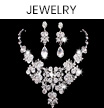
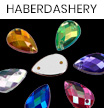

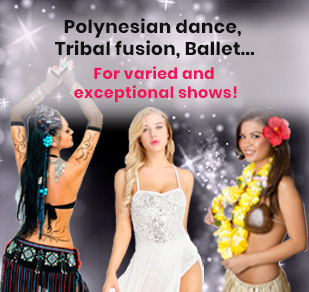


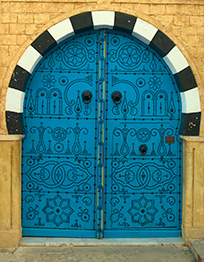





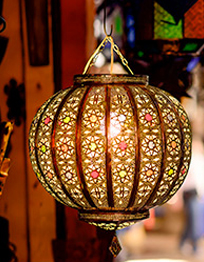


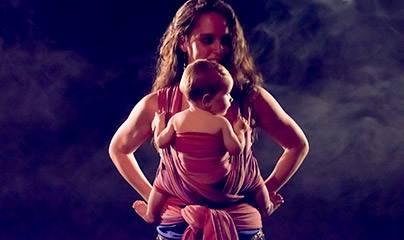
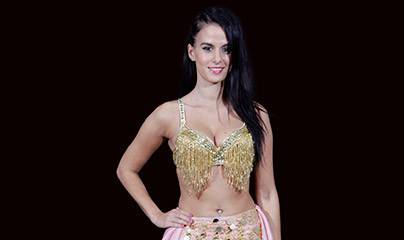
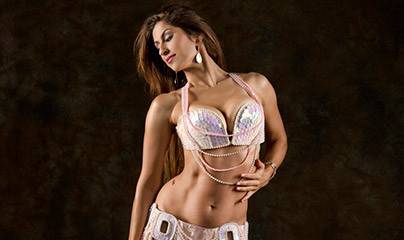
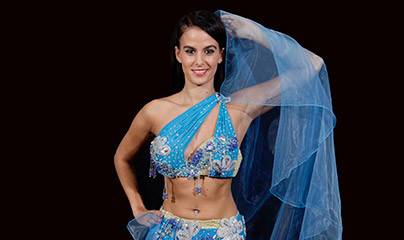
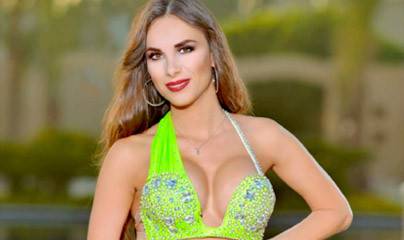
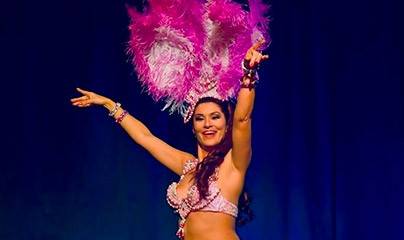
Leave a comment
Login to post comments